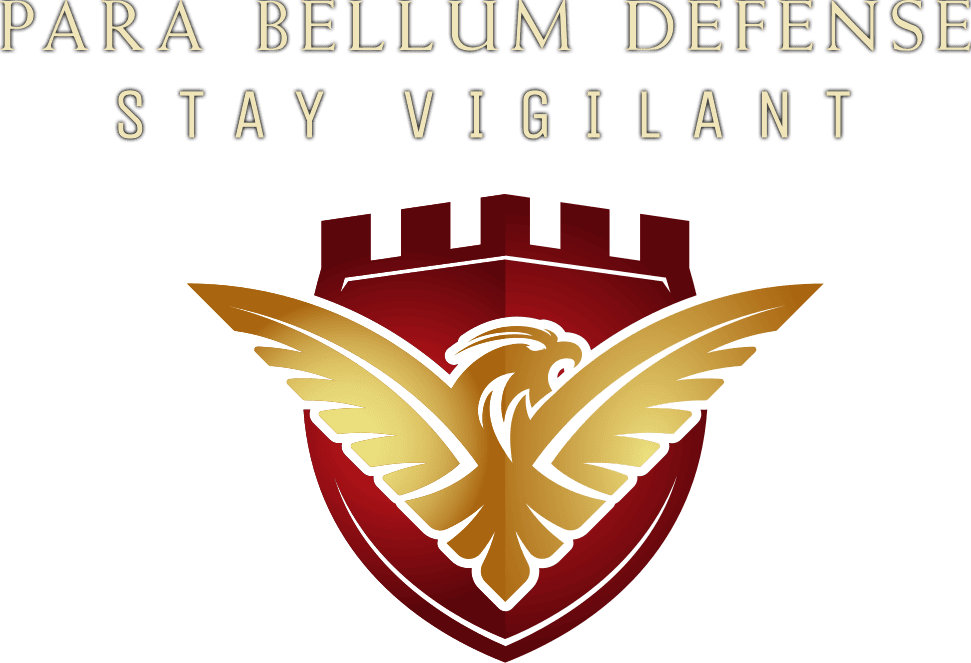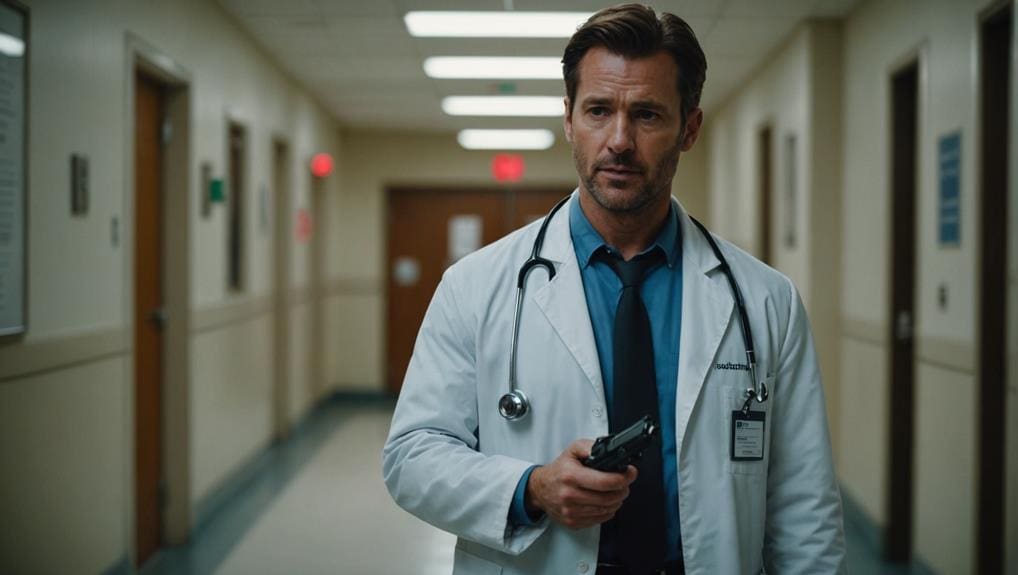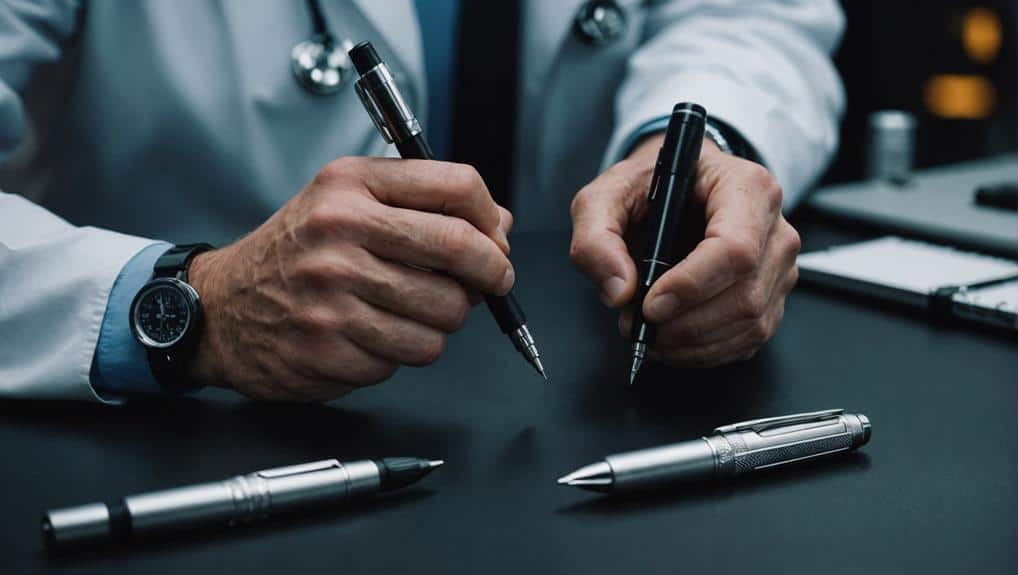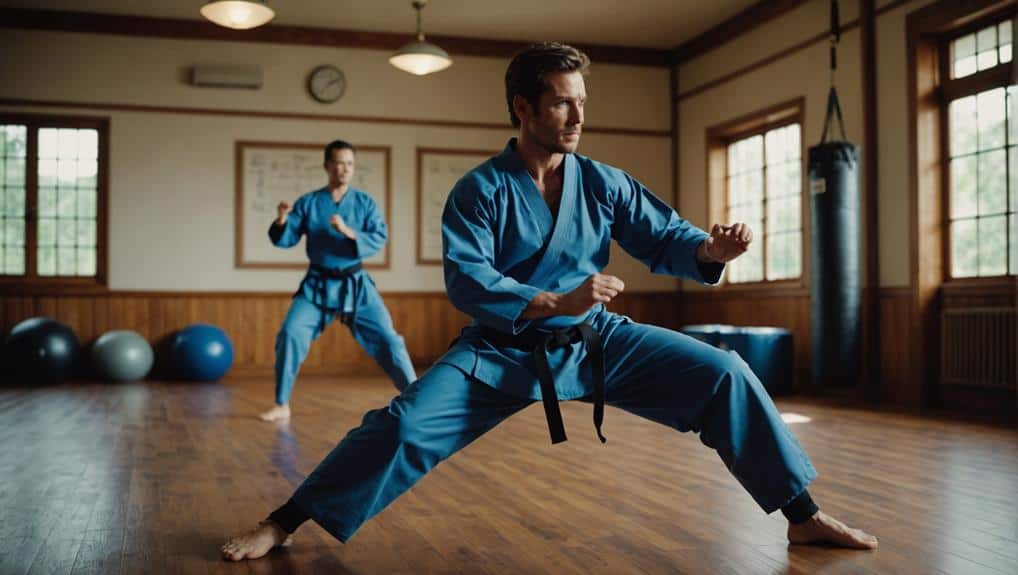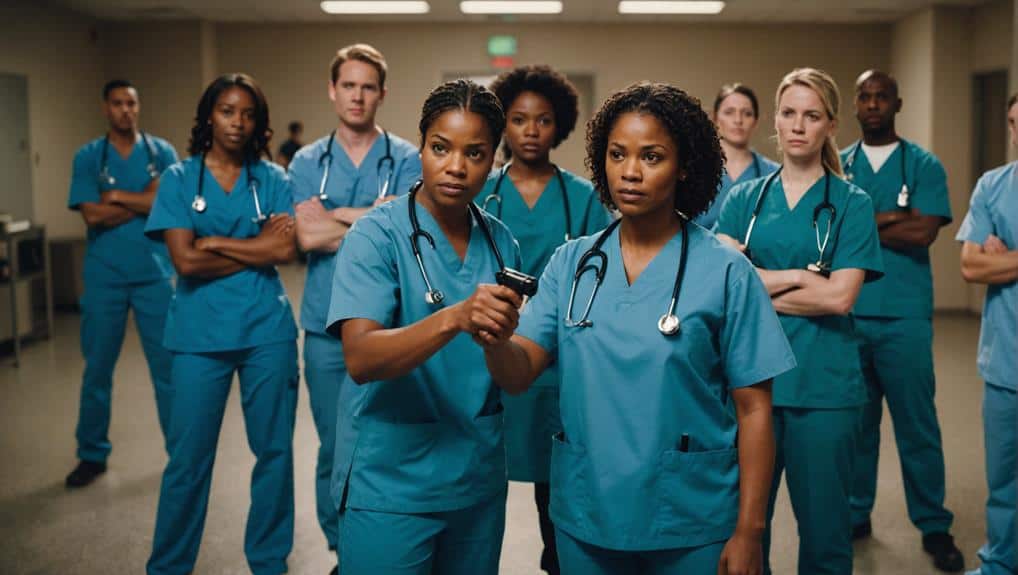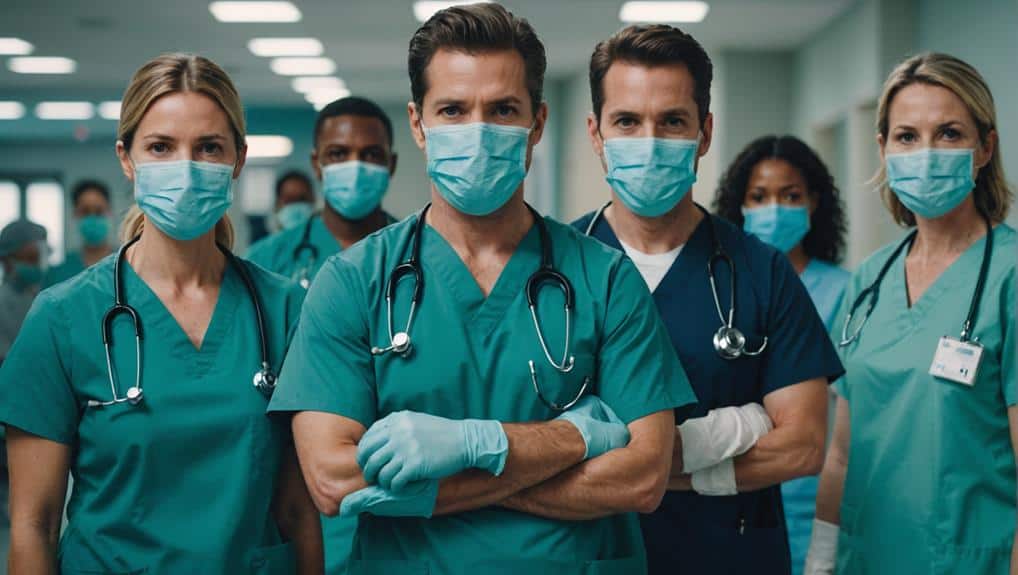Working in a hospital can be wild and unpredictable, so having the right
self-defense gear is essential. Consider carrying a
kubotan—it’s small and perfect for targeting pressure points but be sure to get some training.
Tactical pens are another discreet option that doubles as writing tools. While pepper spray like the
Mace Brand Pepper Gun works wonders, be cautious in hospital settings. Knives are a no-go and can land you in trouble, so skip those. Finally, think about joining
martial arts classes like Krav Maga or Brazilian Jiu-Jitsu—they can teach skills that blend perfectly with your medical responsibilities. Curious to learn about more practical tools?
Concealed Carry Restrictions
When it comes to
concealed carry restrictions, hospitals are typically classified as
non-permissive environments for firearms, meaning you can’t bring a concealed weapon onto the premises. It’s essential for healthcare professionals like you to understand your facility’s
specific rules. Ignoring them could lead to
legal trouble or even lose your job.
Now, you might be thinking, “What about my safety?” Good question! While carrying a firearm isn’t an option, there are other ways to stay safe. For instance, focusing on
situational awareness is key. Knowing where medical supplies are located can be surprisingly helpful in a pinch. Imagine using a stethoscope like a makeshift weapon! Okay, maybe not, but you get the idea.
When it comes to gear, you’ll find that
recommended concealed carry options like the CrossBreed Modular Belly Band can be a lifesaver. It fits snugly under your scrubs without drawing attention. Ankle holsters and OWB holsters, though, are a big no-no. They’re just
too risky and visible.
Pepper Spray Considerations
Pepper spray might seem like a practical self-defense tool, but it comes with a host of considerations, especially in a hospital setting. You might think it’s handy for emergencies, but using it indoors can spell trouble, particularly for patients with respiratory issues. Imagine the chaos if you accidentally spray it in a crowded hallway—yikes!
Quick Considerations:
| Factor |
Details |
| Effectiveness |
Limited in life-or-death situations. |
| Recommended Use |
Best for short walks to/from your vehicle. |
| Hospital Policies |
Often classified as non-permissive. |
Before you grab that can of pepper spray, check your hospital’s policies on self-defense tools. Many hospitals don’t allow them, viewing them as potential hazards. Plus, you’ll need proper training to use it effectively. If you don’t know what you’re doing, you could end up harming patients or coworkers instead of protecting yourself. That’s not what you want, right?
Instead, consider alternatives like personal alarms or tactical pens. They’re often safer and just as effective for self-defense in a healthcare setting. Remember, your goal is to stay safe without compromising the safety of those around you. So, think twice before pocketing that pepper spray!
Kubotans and Tactical Pens
In the domain of
self-defense,
kubotans and
tactical pens offer a blend of practicality and discretion, making them valuable tools for medical staff. Imagine you’re finishing a long shift, and suddenly, you need to defend yourself. That’s where these compact tools shine. Kubotans, those nifty little sticks, are great for targeting
pressure points and joint manipulation, but they do require some training. For instance, the
Kubotan Aircraft Grade Aluminum Keychain is designed as a
personal safety tool and has its origins in Japan for police self-defense training. Experts like Massad Ayoob swear by them, so finding a
qualified instructor could make all the difference.
Tactical pens are your secret self-defense weapon that doubles as a regular pen. Tuck one in your pocket or bag, and you’re ready to write a prescription or fend off an attacker. These pens are perfect in places like hospitals where carrying more obvious self-defense tools might raise eyebrows
Legalities of Edged Weapons
When it comes to
edged weapons like knives, hospitals usually ban them due to safety risks, and you don’t want to get caught in a legal mess just for carrying one. Different places have different rules about blade length and whether you can carry a knife at all, so knowing your
local laws is super important. And hey, if you’re going to carry one, make sure you’re trained up—not just for
self-defense, but to avoid breaking any rules and keeping everyone safe!
Hospital Weapon Prohibitions
Maneuvering the
legal landscape of
edged weapons in
hospital settings can be a complex task for medical staff. Many hospitals strictly prohibit knives and other edged weapons to guarantee everyone’s
safety. Imagine rummaging through your medical kit and coming across a scalpel, only to remember that carrying such items outside of their intended medical use could land you in hot water.
Each state, and even each facility, has its own rules. One hospital might allow certain tools while another has zero tolerance. It’s vital to know your hospital’s
specific policies and local laws. You don’t want to be the one who unknowingly breaks the rules and faces
serious consequences.
Bringing a knife to work for
self-defense might seem like a good idea at first, but it can backfire.
Legal repercussions aside, it can escalate conflicts and create a hostile environment. Plus, hospital security takes these matters very seriously.
Instead, consider alternative self-defense tools and techniques. Training in these areas not only keeps you compliant with hospital regulations but also prepares you for potential threats in a safer, more effective way. So, ditch the knife and explore other strategies to stay safe at work.
Knife Training Necessities
Understanding the
legalities of edged weapons is essential if you’re considering
knife training for self-defense. Hospitals usually prohibit knives, so knowing your facility’s policies is vital. You don’t want to risk your job or legal trouble by carrying a
prohibited item.
Knife training necessities start with understanding
local laws. States often have specific rules about knife size, type, and carry methods. Imagine thinking you’re prepared, only to find out you’re breaking the law—yikes! So, research your jurisdiction’s regulations thoroughly.
Proper training is a must. You can’t just pick up a knife and expect to defend yourself effectively. Seek out
qualified instructors who focus on practical applications and situational awareness. They’ll teach you how to handle the
knife safely and effectively, minimizing the risk to yourself and others.
Legal implications of using a knife in self-defense can vary widely. In some places, defending yourself with a knife might be seen as
excessive force. Stay informed about
self-defense laws where you live to avoid unintended consequences.
Martial Arts Training
Martial arts training is a fantastic way to boost your
self-defense skills, but picking the right style is key. You’ll find that disciplines like Krav Maga and
Brazilian Jiu-Jitsu not only teach practical moves but also help you stay fit and sharp. Plus, consistent practice means you’ll get better at spotting danger before it hits—talk about a
game-changer for healthcare professionals!
Benefits of Consistent Practice
Consistent practice in martial arts offers numerous benefits that are particularly advantageous for medical staff. Imagine you’re in a high-stress situation at the hospital, and suddenly, things go south. Your martial arts training kicks in, and you react instinctively, thanks to enhanced muscle memory. This makes you highly effective under stress, which is vital in your line of work.
But it’s not just about quick reactions. Regular martial arts sessions improve your overall physical fitness, boosting your strength, agility, and endurance. This means you can not only defend yourself but also evade threats with ease.
Let’s not forget the mental perks. Martial arts training fosters mental discipline and focus, helping you stay calm and make rational decisions even in the craziest hospital scenarios. You learn to read body language and anticipate potential threats, making you more vigilant and aware of your surroundings.
And hey, it’s not all serious business! The community aspect of martial arts training provides a supportive environment that builds your confidence and resilience. You’ll find yourself surrounded by people who lift each other up.
- Enhanced muscle memory
- Improved physical fitness
- Heightened mental discipline
- Increased situational awareness
Choosing the Right Style
While consistent practice in martial arts offers numerous benefits, choosing the right style tailored to your needs is the next essential step. Each martial art brings unique self-defense techniques to the table. Brazilian Jiu-Jitsu (BJJ) is fantastic if you want to master ground fighting and submissions. Imagine pinning down an attacker with a swift move, gaining control in a heartbeat. On the other hand, Krav Maga is all about practical, real-world self-defense, focusing on handling both armed and unarmed attackers. Think of it as your go-to style for those unpredictable, high-stress hospital situations.
Commitment is key here. Martial arts aren’t a quick fix; they require years of consistent practice to achieve proficiency, especially in self-defense. But don’t worry, you won’t be alone on this journey. Martial arts classes can create a tight-knit community among healthcare professionals, fostering collaboration and shared learning experiences. Picture yourself not just as a lone warrior but part of a supportive,
like-minded group.
You’ll want to find qualified instructors who understand the specific needs of healthcare settings. They’ll guarantee your self-defense techniques are effective and,
importantly,
legally compliant. So, lace up those gloves and start your journey today!
Firearms Education Resources
Firearms education resources are essential for medical staff looking to enhance their self-defense capabilities. You’re probably wondering where to start, and the USCCA is a great place to get started. Over 834,181 people trust their thorough offerings for self-defense preparedness and training. They even provide a free guide called “6 Things You Didn’t Know Would Happen When the Police Arrive,” which is a must-read for understanding the legal aftermath of using a firearm in self-defense.
Here are some key resources from the USCCA:
- Training Opportunities: They offer courses that focus on essential skills for personal and family protection.
- Legal Knowledge: The education emphasizes understanding local laws, ensuring you know your rights and responsibilities.
- Community Engagement: By engaging with these resources, you become part of a knowledgeable community of firearm owners.
- Responsible Ownership: It’s not just about safety; it’s about promoting responsible usage among healthcare professionals like you facing unique security challenges.
Getting into firearms education isn’t just about grabbing a gun; it’s about empowering yourself with the knowledge to use it responsibly and effectively. So, why not take that first step towards better protection today?
Community Support
Engaging with your community is a crucial aspect of enhancing
self-defense preparedness for medical staff. By fostering
open dialogue about
safety concerns and self-defense strategies, you create a safer environment for everyone. Every day, you’re surrounded by tools like Sphygmomanometer Blood Pressure monitors and Medical Bags, but awareness and communication are equally essential.
First Responders understand the importance of community support. Participating in
training and safety workshops not only boosts your own skills but also enhances the
collective security awareness of your team. Imagine discussing self-defense during breaks, humorously comparing tuning forks and an Aneroid Sphygmomanometer—these light moments can alleviate tension and foster camaraderie.
The USCCA is a good option for those looking to explore deeper into
firearm education, promoting respectful discussions on self-defense. Make sure you’re part of these conversations, sharing perspectives and learning from others’ experiences. This way, you can develop more effective and thorough security measures within your facility.
In an
active shooter scenario, being prepared can save the day.
Collaboration and a supportive community mean you’re not alone. You’ve got the needed one-two punch of
knowledge and cooperation to stay safe and protect others.
Author Background
You’re in good hands with Kat Ainsworth, who’s got over 15 years in concealed carry and more than 20 years hunting—talk about experience! Her background in K9 Search-and-Rescue and emergency vet medicine means she knows firsthand what it’s like to be in high-stress,
critical situations. Living in Marshfield, Wisconsin, she’s deeply involved in both outdoor and self-defense communities, so her advice on self-defense gear is both practical and spot-on.
Extensive Field Experience
With over 15 years of experience in concealed carry, Kat Ainsworth brings a wealth of knowledge in personal safety and self-defense strategies. Her journey started with a simple interest in firearms, which quickly turned into a passion for teaching others how to protect themselves. You can trust that her advice is grounded in real-world scenarios and extensive field experience.
Kat’s more than 20 years in hunting have given her practical knowledge of outdoor survival and situational awareness, both essential for anyone interested in personal safety. Imagine being alone in the wilderness, relying solely on your wits and skills—that’s the kind of expertise Kat brings to her writing.
Her background in K9 Search-and-Rescue has sharpened her emergency response skills, making her adept at handling high-stress situations. Ever tried finding a lost person in the woods with just a dog and a flashlight? Kat has, and she’s thrived.
Living in Marshfield, Wisconsin, she combines her passion for firearms with a commitment to educating others, especially healthcare professionals, about safety and self-defense.
- 15+ years in concealed carry
- 20+ years in hunting
- K9 Search-and-Rescue experience
- Emergency veterinary medicine
Kat’s insights are invaluable for anyone looking to enhance their personal safety in challenging environments.
Diverse Expertise Areas
Living in Marshfield, Wisconsin, Kat Ainsworth combines her extensive field experience with a diverse skill set that makes her uniquely qualified to advise on
self-defense for medical professionals. With over 15 years of
concealed carry experience and more than 20 years in
hunting, Kat’s background offers a well-rounded perspective on self-defense gear. But it’s not just about the gear; it’s about understanding the unique
safety protocols in healthcare settings. Medical staff can benefit greatly from
compact and portable self-defense tools that do not interfere with their duties.
Imagine you’re working a late shift in a busy hospital. Kat’s knowledge, rooted in her background in K9 Search-and-Rescue and emergency veterinary medicine, becomes invaluable. She knows the importance of practical self-defense tools that won’t interfere with your work. Her firsthand experiences in
high-stress situations give her insights that are both practical and profound.
Kat also stresses the need to understand
facility rules regarding concealed carry. It’s not just about being prepared; it’s about ensuring you’re compliant with institutional policies. She advocates for
situational awareness and
proper training in self-defense techniques. For
healthcare professionals, these skills can mean the difference between safety and danger. So, take a page from Kat’s book and be prepared, aware, and knowledgeable
Related Articles
When considering essential self-defense gear for medical staff, it’s beneficial to investigate related articles that examine the specifics of non-lethal tools and situational awareness. You might be surprised at the variety of options available and knowing where to start can make all the difference!
One article explores
Emergency Protocols, highlighting how vital it is to have a solid plan in place. It emphasizes that knowing how to react in a crisis can be life-saving. From dealing with aggressive patients to unexpected intrusions, having a clear set of steps can keep you calm and collected.
Another interesting read focuses on the Kubotan, a small but mighty tool that requires training for effective use. It’s discreet and can be carried easily, but knowing how to use it properly is key.
You’ll also find valuable insights on tactical pens. These pens aren’t just for writing—they can be used for self-defense while being easily disguised as a common item.
Lastly, situational awareness is a hot topic. Articles stress the importance of always being aware of your surroundings and understanding potential threats before they escalate.
- Emergency Protocols
- Kubotan Training
- Tactical Pens
- Situational Awareness
Investigating these related articles can provide you with the knowledge and confidence to protect yourself in any situation!
Self-Defense for Healthcare
In the high-stakes environment of healthcare, defending yourself effectively without compromising patient care is paramount. You can’t carry firearms, so you need to think outside the box for
personal safety. That’s where
crisis management comes into play.
Situational awareness is your first line of defense. Always keep an eye on your surroundings, because noticing
potential threats early can make all the difference. Picture yourself in a bustling ER: knowing who’s coming and going can help you spot trouble before it escalates. Additionally, consider outfitting yourself with a
Mace Brand Pepper Gun 2.0, which can spray OC pepper up to 20 feet away and is equipped with a dual mode LED light for distraction and aiming.
For
discreet self-defense, consider tools like
kubotans or
tactical pens. They’re small, easy to carry, and can pack a punch when used correctly. But remember, without
proper training, they’re just fancy paperweights. So, take a class or two to learn how to use them effectively.
Pepper spray might seem like a good idea, but it’s a no-go inside hospitals. Imagine spraying that in a room full of patients with respiratory issues – not good! Save it for when you’re outside.
Lastly,
martial arts training isn’t just for Bruce Lee wannabes. Learning a few techniques can give you the confidence and skills to handle
unexpected confrontations. Plus, it’s a great workout
Frequently Asked Questions
What Is the Best Self Protection Device?
Wondering about the best self-protection device? For personal safety, consider the CrossBreed Modular Belly Band. It’s discreet and effective for concealed carry, but always make certain you understand your facility’s carry policies before making a decision.
What Is the Best Weapon to Carry for Self-Defense?
The best weapon for self-defense is a tactical flashlight. You can carry it discreetly, use it to disorient an attacker with its bright light, and it doubles as a striking tool. Prioritize training and situational awareness.
Imagine yourself as a warrior with a shield and sword. For self-defense, a kubotan and pepper spray are your best empowerment strategies. They’re compact, easy to use, and legal in many places. Stay alert and confident.
What Should I Get to Protect Myself?
For personal safety, consider a kubotan with proper training, a discreet CrossBreed Modular Belly Band for concealed carry if allowed, or martial arts training. Always check your facility’s rules and legal implications before choosing your self-defense tools.
